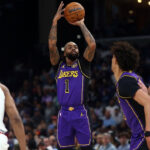
The Los Angeles Lakers‘ decision to bench D’Angelo Russell signals a major shift. For the first time this season, Cam Reddish started over him in the Lakers’ win against the Philadelphia 76ers. Rookie coach JJ Redick’s decision wasn’t just about lineup dynamics; it highlights Russell’s diminishing trade value. His role reduction adds to mounting evidence that he’s no longer the high-demand asset he once was.
Lineup Decision Further Proves D’Angelo Russell Lakers ‘Reality’
Russell, averaging 12 points and 5.8 assists per game prior to Saturday’s game, has struggled under Redick. Shooting just 37.5% entering Friday, he’s also been passive on both offense and defense. His declining performance and costly mistakes, which led to his second-half benching in a loss to Memphis, further underscore the issue. Redick even showed his frustration with a Russell play in a recent loss to the Grizzlies. As Russell’s value declines, the Lakers find themselves with fewer viable trade options.
A Contract Year That Hasn’t Lived Up to Expectations
Entering a contract year after picking up his player option, Russell was expected to raise his stock and provide consistent play. However, his performance is anything but what the Lakers anticipated. With career-low averages in traditional stats, he’s scoring just 12 points on 11 shots per game and shooting 29.2% from beyond the arc through Friday. Instead of capitalizing on his contract year, Russell’s declining efficiency has raised more doubts.
These struggles haven’t gone unnoticed by potential trade partners. Already this season, the Lakers have reportedly attempted to trade him, but teams weren’t interested. The Lakers’ options now appear limited. Russell may still be of some use as a salary filler in trades, but with NBA teams pursuing playoff spots longer into the season due to the play-in tournament, the number of salary-shedding trades has declined.
Russell’s Market Value Is at an All-Time Low
Russell’s market value has never been lower, and it shows. This season, the Lakers reportedly offered Russell and multiple first-round picks to the Utah Jazz, hoping to land a player like Walker Kessler. The Jazz declined, showing more interest in a deal involving other players instead. This rejection reflects the larger reality: NBA teams no longer view Russell as a premier asset.
Russell’s best trade potential is likely as part of a package for mid-level players like Bruce Brown or Collin Sexton. Such players could contribute to the Lakers’ needs without requiring major sacrifices. But for a rebuilding team looking to shed salary or acquire young talent, Russell holds little appeal. He no longer fits the profile of a tradeable high-value piece; instead, he’s more of a burden than an asset.
The Lakers’ Path Forward With D’Angelo Russell
The Lakers now face a dilemma. Trading Russell for a high-value player is unrealistic. His current market value suggests they’d get only modest returns, which makes holding onto him the wiser option. Redick’s recent lineup changes give Russell a chance to play more freely off the bench, allowing him to lead the second unit without deferring to stars like LeBron James and Anthony Davis.
Russell’s focus should be on rebuilding his value, not just for this season, but for his future in the league. The Lakers would benefit from Russell proving he can be a productive, consistent player. With limited flexibility for future trades and a bleak future post-LeBron, the Lakers must avoid depleting their assets on pipe-dream trades. They need Russell to perform better, not just to maintain competitiveness this season, but to safeguard against a difficult rebuild.
D’Angelo Russell’s Future Remains Uncertain
The Lakers’ decision to bench Russell should serve as a wake-up call for him. His diminishing trade value shows that teams are no longer convinced of his impact. At this stage, Russell’s best chance to re-establish himself as an asset lies in improved on-court play and more consistent performances. With the league’s recent focus on competitive balance, finding a team willing to take on Russell’s contract is unlikely.
If Russell can’t improve his output, the Lakers may ultimately view him as a short-term placeholder rather than an asset. They could let him walk in free agency if they find no takers. In a crowded Western Conference, where playoff spots are hard-fought, the Lakers must make calculated decisions. For now, Russell is worth more on the Lakers’ roster than as a trade asset.
Russell’s ‘reality’ is clear: he’s no longer valued that highly in the league. The Lakers need him to accept his new role, prove his value, and work toward a more impactful future — for his career and the Lakers’ postseason hopes.
The post Lineup Decision Further Proves D’Angelo Russell Lakers ‘Reality’ appeared first on Last Word On Basketball.